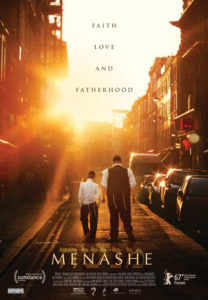 Most of us will never see the Ultra-orthodox Hassidic Jewish culture from the inside. Menashe is one such opportunity. Shot in Brooklyn and almost entirely in Yiddish, it’s the story of a widower named Menashe (Menashe Lustig) who seems destined to fail in the eyes of his community, leaving him all alone while his young son Rieven (Ruben Niborski) is forced to live with his brother-in-law. It’s really a simple story of a father struggling to get his child back while living within the strictures of his faith, which is not easy for him to do.
Most of us will never see the Ultra-orthodox Hassidic Jewish culture from the inside. Menashe is one such opportunity. Shot in Brooklyn and almost entirely in Yiddish, it’s the story of a widower named Menashe (Menashe Lustig) who seems destined to fail in the eyes of his community, leaving him all alone while his young son Rieven (Ruben Niborski) is forced to live with his brother-in-law. It’s really a simple story of a father struggling to get his child back while living within the strictures of his faith, which is not easy for him to do.
Menashe is a schlub. He doesn’t wear the coat and hat of his Hassid brothers. He’s overweight. He’s never made much money and works in a grocery store. And he makes mistake after mistake, at home, at work, even with his son. But he adores Rieven, and having the rabbi tell him he has to leave him with his dead wife’s brother until he is remarried is killing him. Still he seems in no hurry to find another wife. Menashe means well, but he seems to like to question the rules. And his community is all about rules. He is reminded again and again by his brother-in-law that he is not a mensch, and the question is whether he will step up to being one to get his son back.
Menashe feels like an ethnographic film with stretches that are more fly-on-the-wall than story, which makes sense since this is the first feature from documentary filmmaker Joshua Z. Weinstein. But’s hard not to be judgmental about the way they live their lives so cut off from modern cultural norms. I mean who takes a kid away from a father because his wife died? It’s more interesting than engaging, though Menashe Lustig does a great job as the warm hearted ne’er-do-well. I’m on the fence about this one. Not a lot of people are going to see it since it is in Yiddish, but I’m more interested to see what the director does next. He knows how to make a film.

I (Mainstream Chick) agree with Arty for the most part. The film is more interesting than entertaining. I think it may have struck a stronger chord if it hadn’t come out so close to the recent Israeli films The Women’s Balcony and The Wedding Plan, which also touched on the lives and choices of members of ultra-orthodox communities. Menashe is yet another solid option for the Jewish arty crowd. I don’t think it will necessarily resonate with folks who don’t have at least some familiarity or understanding of the Hasidic community, culture or traditions. They may just see it as really warped that a father would lose custody of his kid because he doesn’t have a wife at home. Go figure.